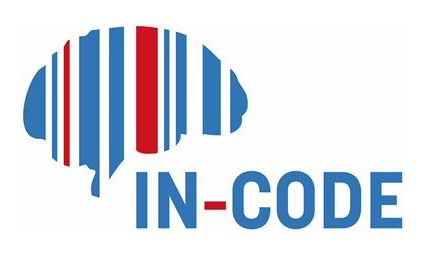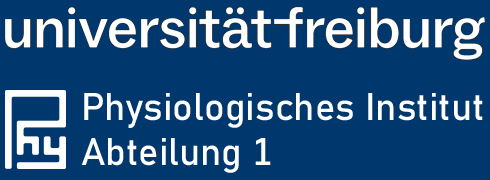
Inhibitory neurons: shaping the cortical code (IN-CODE)
General Information about the Collaborative Research Centre (CRC)
Coordinator: Marlene Bartos (Freiburg) Vice-coordinator: Jörg Geiger (Berlin)
The brain is the most complex information processing system that enables us to feel, act, learn and remember, to process and store information with an efficiency and flexibility that by far surpasses any machine. At the same time, dysfunctions of the brain cause a number of devastating cognitive disorders.
All cognitive functions depend on the cortex, the largest and most powerful region of the mammalian brain. Looking at neurons it comprises ~80% excitatory principal neurons (PNs) but also a smaller but highly diverse class of GABAergic inhibitory interneurons. PNs represent information at the single cell level (‘single neuron code’) or population level (‘population code’). However, their activity is markedly shaped by the GABAergic inhibitory interneurons. Interneurons come with distinct morphologies, molecular and synaptic properties, connectivities and activity profiles and may thereby endow the network with a large number of distinct control points for tuning cortical codes according to dynamically changing computational demands.
Using mouse models for genetic circuit dissection and human tissue we will focus on a number of cortical areas that are vital for higher brain functions. By combining state-of-the-art optical and electrical recordings with pharmaco- and optogenetic perturbation, quantitative behavior, computational modeling, modern tools for high-dimensional data analysis and deep learning, this CRC/TRR will provide multidisciplinary insights on the role of inhibition in controlling the encoding of information in local circuits and complex brain functions and thereby shaping the cortical population code.
IN-CODE is a Transregio (TRR), a Collaborative Research Centre (CRC) located at multiple sites. TRR/CRC-384 is located in Freiburg and Berlin, and collaborations between the two cities are actively promoted. The selected PhD students will enrol in the local graduate schools, SGBM (Spemann graduate school of Biology and Medicine) and ECN (Einstein Center for Neurosciences), respectively, and will have access to the qualification program offered by the entire network.
The following PhD student positions in Freiburg are now available:
(Salary scheme E13 TV-L, 65%)
Project A01: Prof. Marlene Bartos
(2 positions)
https://physiology-freiburg.de/
Role of dentate gyrus GABAergic interneuron types in long-term information encoding by principal cells
Here we aim to examine how interneuron (IN) types contribute to high spatial map stability in the mouse dentate gyrus (DG). To address this question, we will perform 2- / 3-photon calcium imaging of neuron populations in head-fixed mice navigating through virtual realities. We will apply pharmaco-/optogenetic tools to modulate IN type activity to examine its influence on population activity and behavior. By performing deca-patch recordings in acute slices, we will examine the underlying structural-functional microcircuit organization. By using artificial intelligence algorithms, we will uncover how INs contribute to internal structure of active networks & encoding of behavioural variables at the level of population codes.
Direct applications for these two positions are possible! Send us your CV and brief statement of interest to dagmar.sonntag@physiologie.uni-freiburg.de
Project B03: Prof. Andreas Vlachos
(2 positions)
https://neuroanatomie.uni-freiburg.de/
Modulation of cortical inhibition by transcranial magnetic stimulation in rodents and humans – network effects and molecular mechanisms
Transcranial magnetic stimulation (TMS) is a non-invasive brain stimulation technique, which modulates cortical excitability beyond the stimulation period. Despite its clinical use it remains unclear if and how TMS mediates changes in synaptic transmission, neuronal excitability, and network activity. We investigate network effects and the underlying molecular mechanisms of TMS protocols in cortical circuits of mice and humans, focusing on parvalbumin-expressing basket cells and somatostatin-expressing dendritic inhibitory interneurons. Our major goal is to identify the cellular and molecular mechanisms of clinically approved TMS on interneuron function and plasticity.
The following PhD student positions in Berlin are now available:
(Salary scheme – 65% of a Scientific Investigator position)
Project A04 Prof. James Poulet
2 positions (MDC Berlin)
https://www.mdc-berlin.de/poulet
Inhibitory control of thermal perception in mouse posterior insular cortex
We hypothesis that inhibitory interneurons (INs) in the posterior insular cortex (pIC) are key players in the encoding and perception of thermotactile information. Here we will examine the role of different IN types in sensory encoding and determine how their function is related to underlying synaptic connectivity. We have two aims: (1) use widefield and cellular imaging to identify the thermotactile encoding schemes by pIC INs and test their role in perception using optogenetic manipulations; (2) combine in vivo imaging with in vitro cortical slice work to delineate the local pIC synaptic wiring motifs in cells of known sensory response properties.
Project B04 Prof. Jörg Geiger
2 positions (Charité Berlin)
https://neurophysiologie.charite.de/en/research/geiger_group/
Investigating the fast-spiking interneuron microcircuit topology of mouse and human neocortex
Neuronal networks store and process information by the local structural and functional connectivity of excitatory and inhibitory neurons. In this project we plan to investigate how fast-spiking inhibitory interneurons are embedded in cortical subnetworks with structural and functional features tailored for specific region and species-dependent computational requirements.
Project B06 Prof. Christian Madry
1 position (Charité Berlin)
https://neurophysiologie.charite.de/en/research/madry_group/
Role of microglia-interneuron interactions in shaping network function
In this project, we aim to explore the role of bidirectional communication between microglia and parvalbumin-positive interneurons (PVIs) in the hippocampal CA1 region. We will test the hypothesis that microglial regulation of PVI activity modulates gamma frequency oscillations that critically depend on PVI function. This will be tested in wild-type and DISC1 mice, which serve as a model system of impaired PVI and gamma function. Using a combination of in vivo and ex vivo electrophysiology, multi-photon imaging and biochemical analyses, we aim to identify the impact of microglia-PVI interactions for microcircuit function and to reveal how microglial dysfunction relates to oscillatory network defects.
Applicant requirements
We are looking for highly motivated doctoral candidates with a background in the life sciences who are strongly committed to basic and translational research. Applications from all nationalities will be considered. A Master of Science degree is required to enter the PhD program.
We are an equal opportunities employer with a diverse, international team. Flexible starting times are possible between April 1 2024 and July 2024. Successful candidates will also be enrolled in the Spemann Graduate School PhD program, which offers a variety of courses and events to increase integration, skills and career development.
To apply:-
Please use the application tool of the Spemann Graduate School of Biology and Medicine (SGBM). https://sgbm.uni-freiburg.de/node/1847
You should first register here https://www.sgbm.uni-freiburg.de/user/register to create an account and access the application form.
Please make sure to select „SFB/TRR 384“ in the “Select Track” drop down menu.
The information that you enter in the various fields of the application form is NOT saved automatically. Please save your progress before logging out!
To continue with the application at a later time point, you should re-enter your login data, click on „SGBM menu“ and „My Application“ to access again your application form.
Relevant documents can be uploaded. Kindly make sure that the documents you upload are not secured or protected, otherwise they will not be processed correctly by the system. Also, if you copy/paste text into the fields (e.g. thesis abstract), make sure you paste unformatted text.
Once you have filled out all relevant and required fields, press the submit button to complete the application process. Please note that you will NOT receive a confirmation email. When you press the submit button, an automatic email will be sent to your referees, inviting them to submit their reference online by clicking on a link. You will be able to check whether they have submitted their references in the „My Application“ menu.
Application Deadline:- March 15th 2024
Candidates will be selected for „online“ interviews occurring in March.


